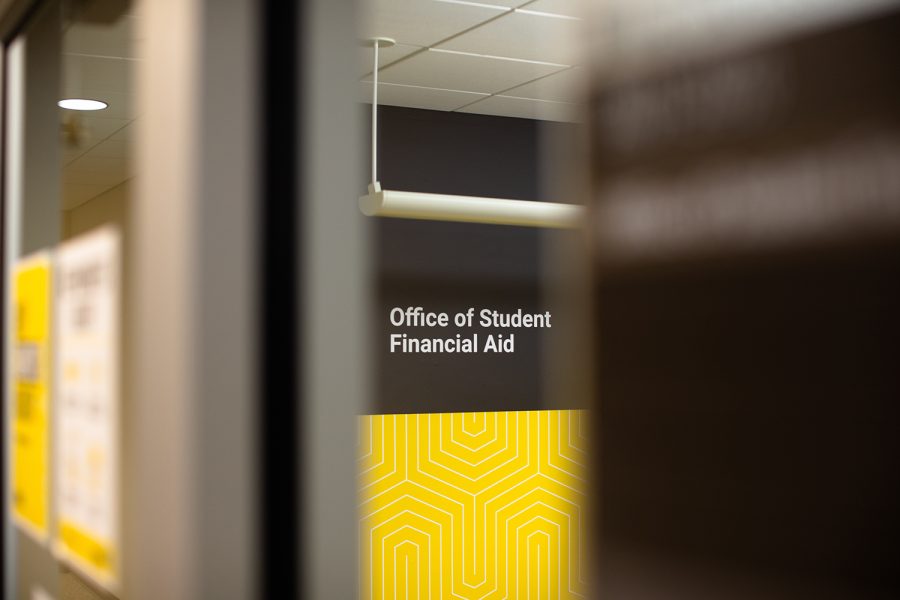COVID-19 relief funds now available for international students
The University of Iowa has received over $22 million to distribute to students who demonstrate exceptional financial need in the 2021-2022 Higher Education Emergency Relief Fund funding round. This round also makes international, DACA, undocumented, and non-citizen students eligible.
The University of Iowa Office of Student Financial Aid is seen at the Old Capitol Mall on Thursday, Oct. 14, 2021. (Gabby Drees/The Daily Iowan)
October 14, 2021
The University of Iowa received its highest sum of Higher Education Emergency Relief Fund funding than previous years to distribute to students with exceptional financial need.
Previous rounds of this relief funding was only available U.S. Citizens. This round, funds will be available for international students, Differed Action for Childhood Arrival recipients, undocumented students, and other non-U.S. citizens.
From the first two rounds of the funding, the UI received the same amount, but for the third round it received significantly more, Cindy Seyfer, assistant provost and director of student financial aid wrote in an email to The Daily Iowan.
“During the earlier two funding rounds, the University of Iowa received $8,085,677 each time for student support,” wrote Seyfer. “For the 2021-2022 funding round, the university was given $22,421,229 to assist students with exceptional financial need.”
The funding was established by the CARES act passed by Congress in March 2020 to provide economic relief during the pandemic.
RELATED: Coronavirus relief grant applications open to students through end of March
Eligibility for the funds for U.S. citizens and FAFSA eligible non-citizens includes:
- Having a valid 2021-2022 Free Application for Federal Student Aid
- Being enrolled in fall 2021 classes
- Students cannot have scholarships, grants, and/or fellowships that meet their 2021-2022 cost of attendance
- Undergraduate students must have an Expected Family Contribution of $20,000 or less
- Graduate and professional students must have an Expected Family Contribution of $5,846 or less and do not have a research or teaching assistantship of quarter-time or more
- Students’ Expected Family Contributions must not be greater than their estimated cost of attendance
Students need to apply and explain their financial circumstances in MyUI by Nov. 5, Seyfer wrote.
Emails will be sent out to these students who cannot file the FAFSA in early October from the International Students and Scholars office, the Center for Diversity of Enrichment and the Dean of Students Care and Assistance team, Seyfer wrote.
Russell Ganim, associate provost and dean of international programs at the UI, said he thinks the awards could significantly help international students.
“Many international students and their families have endured great hardship due to the pandemic,” Ganim said. “There’s been an economic downturn in many parts of the world due to COVID and that’s affected our international students.”
Foreign currency rates have fluctuated because of COVID-19, Ganim noted, leading to disadvantages for international students in certain countries.
“The price of everything is more expensive because the currency of their home countries has declined or the value of their currency in their home countries has declined due to COVID-19,” Ganim said.
The eligibility changes are welcome news to the UI International Programs, Ganim said.
“We’re going to do everything we can to publicize the availability of funds, and we certainly hope that international students take advantage of this opportunity,” he said.
Currently, the UI is using a tiered approach for the awarding, with the largest award amounts given to students with the lowest Expected Family Contributions, Seyfer wrote. Priority had to be given to domestic students who demonstrate exceptional financial need per federal guidance.
“Awards totaling $11,508,500 were given to 9,277 students,” Seyfer wrote. “Of this number, 78 percent were undergraduate and 22 percent were graduate and professional students. The average HEERF grant amount was $1240.”
Students who receive the award can choose whether they want to put the money toward their U-bill directly or have it refunded into a bank account of their choice. Sixteen percent of students chose to put the awards toward their U-Bill, Seyfer wrote.
Jay Page, a first-year student, said one of the first things they did when they received the award was restock on groceries. They have been working to have enough money for necessities, they said.
“This $1500 that just instantly got dropped in was a significant boost that allowed me to have a bit of leeway,” Page said. “When I first started my job I was working 20 hours a week just to make sure I have that comfort and safety of ‘I have money, I can afford to do certain things.’”
The award has given them safety and took them out of the “dangerous territory” they felt they were in, Page said.
“Being able to have this noticeable cushion is comforting. I know that with this money, I’m not going to go without for at least some time,” Page said. “Now I don’t need to work that amount of hours just so that I can afford groceries. I’m able to have time for myself and for school.”



